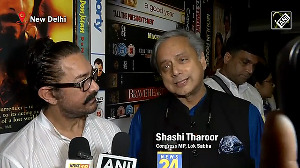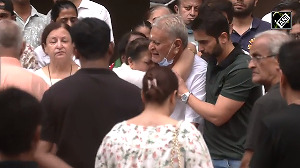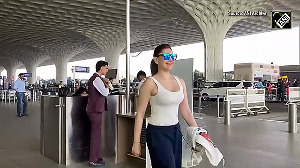The trademark blue and yellow colours, it's believed, will stay. As will the 'flying sun' on the tail of the aircraft.
But the grapevine has it that the name "Jet Airways' will now be written in a different grey typeset and that there will be two ochre bands running down the front. Besides, the aircraft interiors will be newly done up and the cabin crew is to have a brand new wardrobe.
Call it peer pressure or anything else, but from the looks of it, the Rs 5,694 crore (Rs 56.94 billion) Jet Airways is feeling the heat of the competition.
That is possibly why it has decided to give itself a makeover. About a year back, Chairman Naresh Goel announced that Jet would be upgrading its services with the best in in-flight entertainment.
That's happening now along with the refurbishing of the aircraft. Industry watchers say the makeover's not a bad idea because fatigue can set in with any consumer brand and rejuvenating it can't hurt.
Says a consultant, "Airlines like Kingfisher are seen to be offering more since they provide entertainment and reclining seats." He adds, "Jet cannot afford to be perceived as inferior in any way in such a competitive market."
However, the consensus among industry watchers is that the facelift is unlikely to help the carrier win over too many passengers at home; at best it could help it retain share.
That too is important because Jet has been steadily yielding ground: from a strong 35 per cent a year back, the airline's share dropped to just over 30 per cent in September last year (Source DGCA) and is believed to have fallen further to around 25 per cent since then.
Moreover, with a large proportion of Jet's passengers buying discount fares - 70 per cent in the December 2006 quarter - yields have been under pressure. However, gross yields were up marginally in that period, at Rs 5,570 per passenger, it being the holiday season.
That ensured that the passenger load factor too was a decent 70 per cent but Jet cannot afford to let it fall, if it is to maintain profitability. That may not be easy given that capacity in the industry grew by 45 per cent in CY 2006 over CY2005 to 1.8 lakh seats per day and is expected to rise another 25 -30 per cent in 2007.
It's not that demand hasn't kept pace. Thanks to cheap fares, passenger traffic clocked similar growth rates - more than 50 million passengers flew the Indian skies in 2006 and this should grow by at least 30 per cent in the current year too. But for that to happen, fares need to stay affordable.
Says Gautam Roy of Edelweiss Securities, "With the number of players having increased and the market share getting fragmented, we do not see Jet's domestic business improving significantly from current levels."
That's possibly why Jet has shifted focus to its overseas operations and by August this year, Jet will start flying to the US. Currently, the international operation is not too large with just about 600 flights a month but chief executive officer Wolfgang Prock-Shauer estimates that by 2010, two-thirds of the total distance that Jet flies will be overseas with 1880 international flights a month.
And by then the airline's hoping to pull in half its total revenues from international routes alone - that would be about Rs 9,000 crore (Rs 90 billion).
In FY07 Jet's turnover from overseas operations should be just over Rs 1,000 crore (rs 10 billion) but the good news is that in the December quarter, the business broke even with an operating profit of Rs 1.5 crore (Rs 15 million) on revenues of Rs 205 crore (Rs 2.05 billion).
Says Hemant Patel who tracks aviation at Enam Securities, "Jet has done a wonderful job on the international front. That's largely due to good service and also its pricing strategy . Its fares have been very competitive."
Together with getting a new look, Jet's filling up its hangars and will have a fleet of 90 planes by 2009 from 59 at present. The damage: Rs 8000-Rs 10,000 crore (Rs 80-100 billion) in the next three years. But the money should be well worth it.






